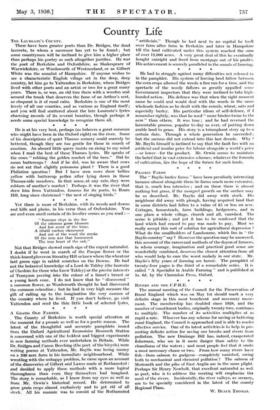He had to struggle against many difficulties not referred to
in the pamphlet. His system of leaving land fallow between the corn crops allowed the weeds a free run for a time, and the spectacle of the weedy fellows so greatly appalled some Government inspectors that they were inclined to take high- handed action. His defence was that when the right moment came he could and would deal with the weeds in the same wholesale fashion as he dealt with the cereals, wheat, oats and especially barley. His particular idiom of self-defence, if I remember rightly, was that he used " more binder-twine to the acre." than others. It was true ; and he had reversed the lamentable process, popular to-day as ever, of putting down arable land to grass. His story is a triumphant story up to a certain date. Through a .whole generation he succeeded : but the success did not extend into this last decade. Why ?
Mr. Baylis himself is inclined to say that the fault lies with an artificial and insular price for labour alongside a world's price —or lower—for the product. Mr. Orwin seems to maintain the belief that in vast extensive schemes, whatever the fortnula of cultivation, lies the hope of the future for such lands.














































 Previous page
Previous page